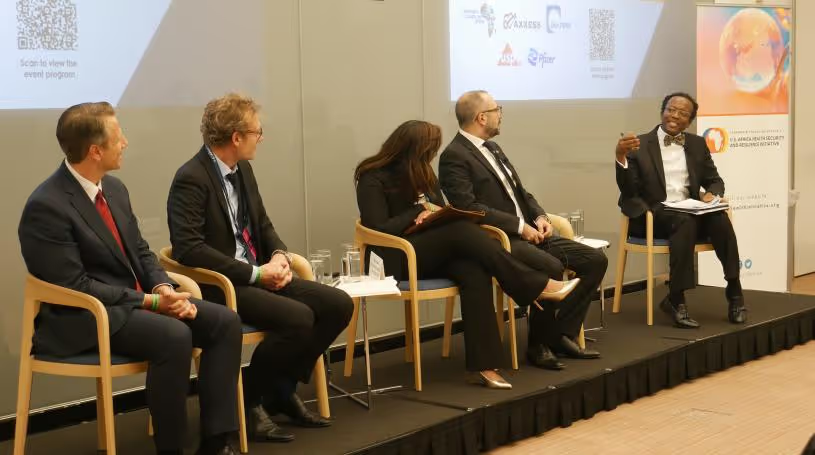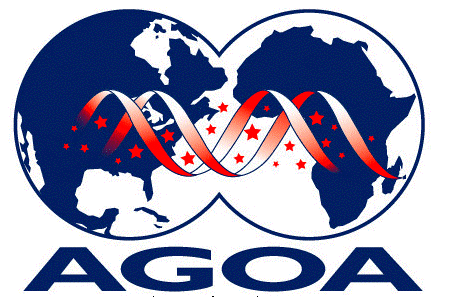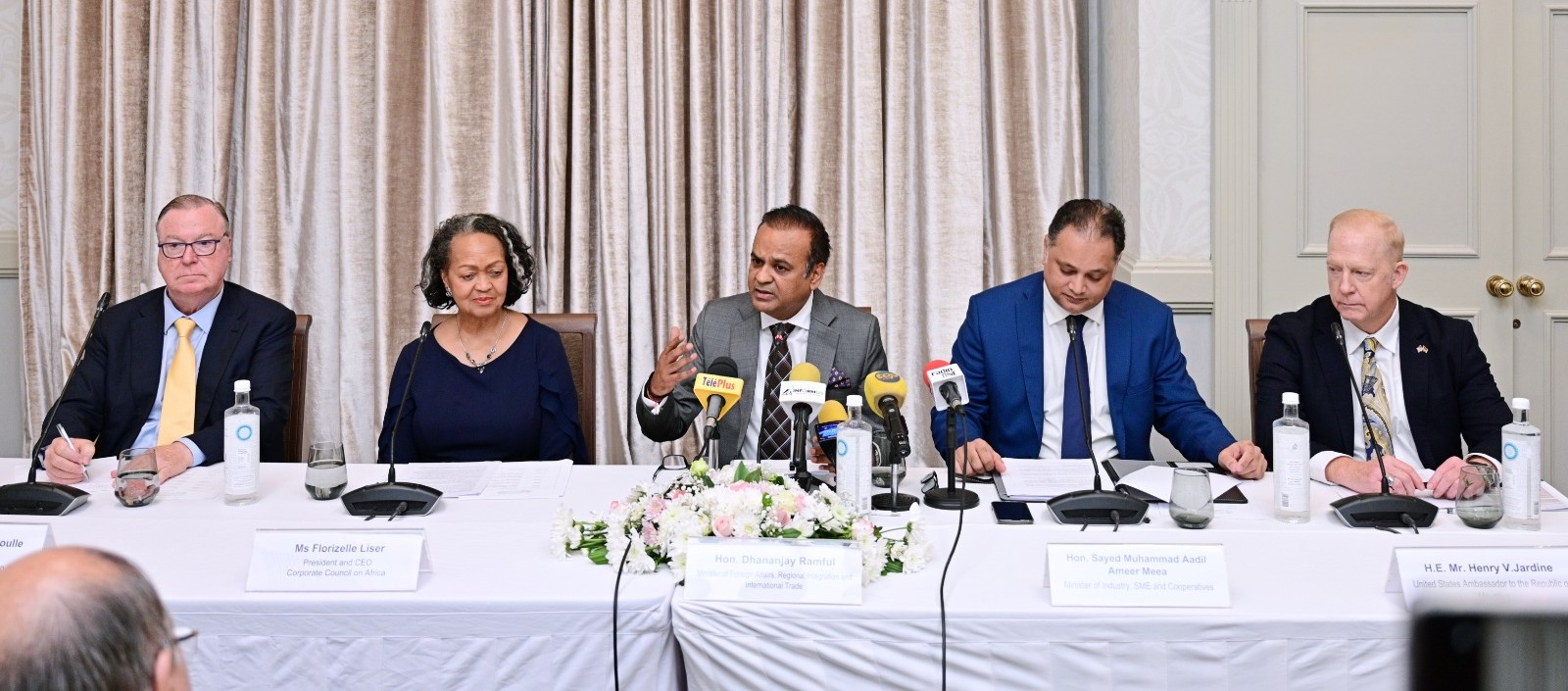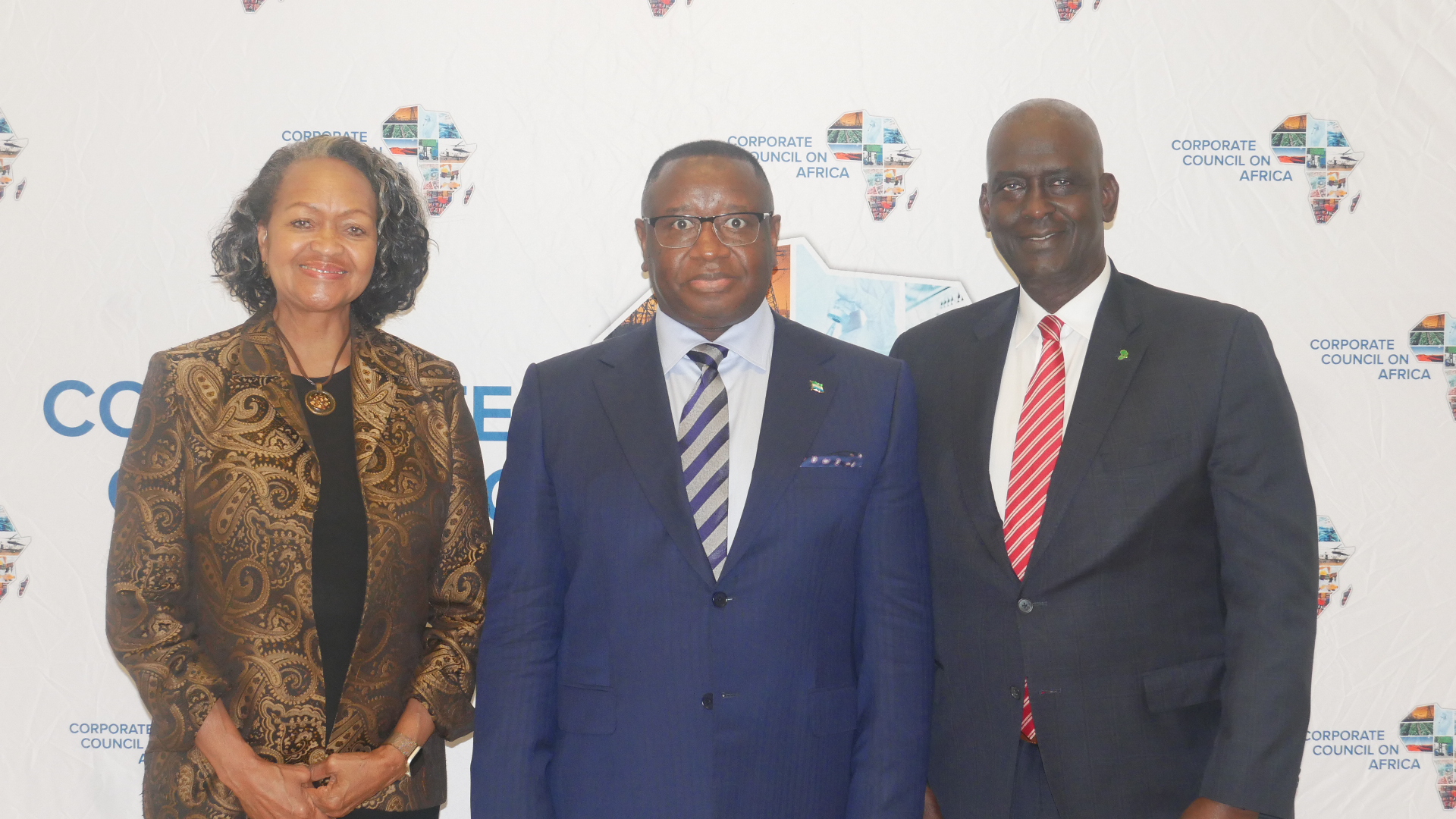"Leveraging the Private Sector to Reach Health Security Goals in Africa" on the sidelines of the 2022 U.S.-Africa Leaders Summit

On Tuesday, December 13, 2022, Corporate Council on Africa’s (CCA) U.S. – Africa Health Security and Resilience Initiative (HSRI) held a high-level forum titled “Leveraging the Private Sector to Reach Health Security Goals in Africa” on the sidelines of the U.S.-Africa Leaders Summit in Washington DC. The event convened CCA’s health sector members, senior U.S. and African government officials including African heads of state and ministers of health, leaders of multinational institutions and CEOs of U.S. and African health companies to celebrate Phase I of HSRI and launch Phase II of the initiative.The discussions focused on leveraging the strengths of the public and private sectors to address a range of health system needs including attracting much needed additional investment, regulatory convergence, local production, increasing efficiency in service delivery and procurement, and better managing existing data to expand overall healthcare access and improve diagnostic abilities.Florizelle Liser, President and CEO of Corporate Council on Africa (CCA) provided opening remarks and thanked the initiative’s task force members and sponsors including HSRI’s seed funder, Pfizer for their strong support and collaboration since the initiative was launched in 2020. Ms. Liser further noted her appreciation for Axxess, U.S. Pharmacopeia, and Xetova for the sponsorship of the event and DLA Piper for hosting it.Florizelle Liser opened the floor to Dr. Danny Tobey, partner at DLA Piper who moderated the fireside chat on “Improving Health Security in Africa through Strategic Partnerships” which featured H.E. Lazarus Chakwera, President of the Republic of Malawi and Ms. Elif Aral, Emerging Markets Access & Accord Commercial Lead, Pfizer. The fireside chat focused on leveraging private sector capabilities to expand access to medicines and strengthen health infrastructure.H.E. President Chakwera highlighted that COVID-19 exposed health system weaknesses and amplified existing public health threats such as Malaria. He emphasized the importance of public and private sector collaboration in providing solutions to health security challenges such as procurement of essential medicines and health products. President Chikwera said he looks forward to addressing some of these challenges through Malawi’s new partnership with Pfizer under Pfizer’s recently launched initiative “An Accord for a Healthier World.” Ms. Elif Aral who leads Pfizer’s Accord initiative noted that the objective of “An Accord for a Healthier World” is to make essential medicines accessible to lower income countries and to make these innovations sustainable. Pfizer has offered to provide products on a not-for-profit basis which is mainly the cost and distribution of the product.Ms. Leah Kaplow, Associate Partner, Social Sector Practice, Mckinsey & Company moderated the high-level panel titled “Regulatory Convergence of Health Products in Africa.” Hon. Dr. Sabin Nsanzimana, Minister of Health, Rwanda provided keynote remarks to set the scene for the panel discussion. During his remarks Hon. Dr. Nsanzimana emphasized that access to quality and safe medicines is key to improving health security in Africa. He discussed the importance of regulatory harmonization and Rwanda’s support of the African Medicines Agency which will be headquartered in Kigali, Rwanda.This session also featured Dr. Michel Sidibé, Special Envoy, African Medicines Agency (AMA) who highlighted the AMA’s work in support of regulatory harmonization and creating an enabling regulatory environment for pharmaceutical sector development among AU member states. Bramuel Mwalo, CEO of Xetova highlighted that supply chain challenges and lack of data are common issues faced by ministries of health. Mr. Mwalo said that leveraging data science and innovations in IT can provide solutions that enable health ministries to make sure essential healthcare products are where and when they are needed without wasting resources.Dr. Ronald Piervincenzi, CEO, U.S. Pharmacopeia (USP) discussed USP’s support of regulatory standards and harmonization through the company’s work with African partners including AUDA-NEPAD. Danielle Agress, Country Manager, Southern Africa Region, U.S. Trade and Development Agency (USTDA) discussed USTDA’s work to strengthen regulatory systems such as partnering with companies to help achieve faster deliveries in rural Africa and providing technical assistance around process efficiency in approving medical products.H.E. Pravind Kumar Jugnauth, Prime Minister of the Republic of Mauritius provided keynote remarks to set the scene in the high-level panel titled “Strengthening Africa’s Health Systems through Private Sector Engagement.” Hon. Jugnauth said “Our government’s top priority is to ensure that our health care system delivers and meet the needs of our citizens by ensuring the modernization of these systems” H.E. Jugnauth emphasized that no government can bear the costs of all health services, but the private sector’s role is crucial in delivering healthcare. He concluded his remarks by noting that countries should view privatization as a mechanism and avenue to financial relief for public sector health programs such as medical technology and production of medical supplies. Mauritius’ strategic plan for 2020-2024 opens opportunities to private sector for engagement and partnership with the government.Landry Signé, PhD, Professor, Thunderbird School of Management served as the moderator on the high-level panel “Strengthening Africa’s Health Systems through Private Sector Engagement”. The panel featured Dr. Mohamed El Sahili, CEO, Medland Hospital, Mr. Nikolaj Gilbert, President & CEO, PATH, Ms. Nafisa Jiwani, Managing Director, Health Initiatives, DFCAnd Mr. Chris Toth, CEO, Varian, a Siemens Healthineers Company.Panelists kickstarted the session by sharing their success stories and best practices for strategic partnerships. Dr. Mohamed El Sahili, CEO, Medland Hospital spoke about his experience during COVID and attributed the success of the vaccination program to public-private partnerships. He said these partnerships are key to making healthcare more effective. Ms. Nafisa Jiwani, Managing Director, Health Initiatives, DFC highlighted DFC’s Global Health and Prosperity Initiative launched in May 2020. Through partnerships with stakeholders and 26 investments, the initiative had the objective of investing $2 billion in 2 years to help increase access to local manufacturing in countries across Africa. Ms. Jiwani said this could not have been achieved without successful collaboration with private sector partners. Panelists emphasized the need to shift to a more holistic approach. The framework set up by organizations such as the Africa CDC, African Union, AMA, and their support in terms of pushing for private sector engagement is crucial to strengthening health security and improving health systems. The panelists agreed that innovation, and trusted partners are central to solving health systems challenges. Ms. Florizelle Liser concluded the program with brief closing remarks.



